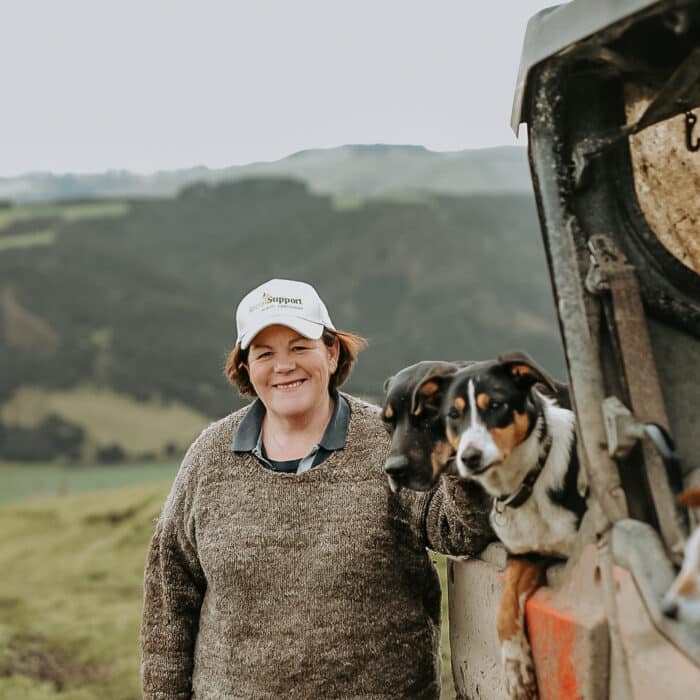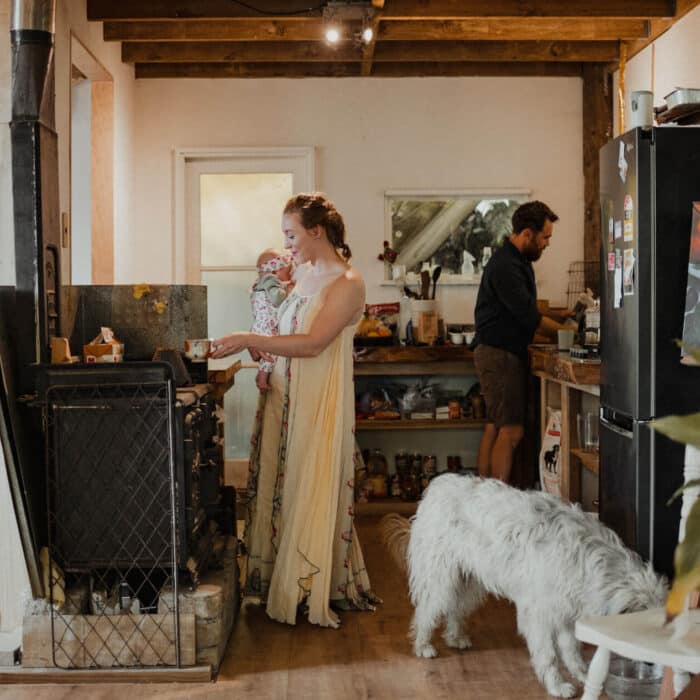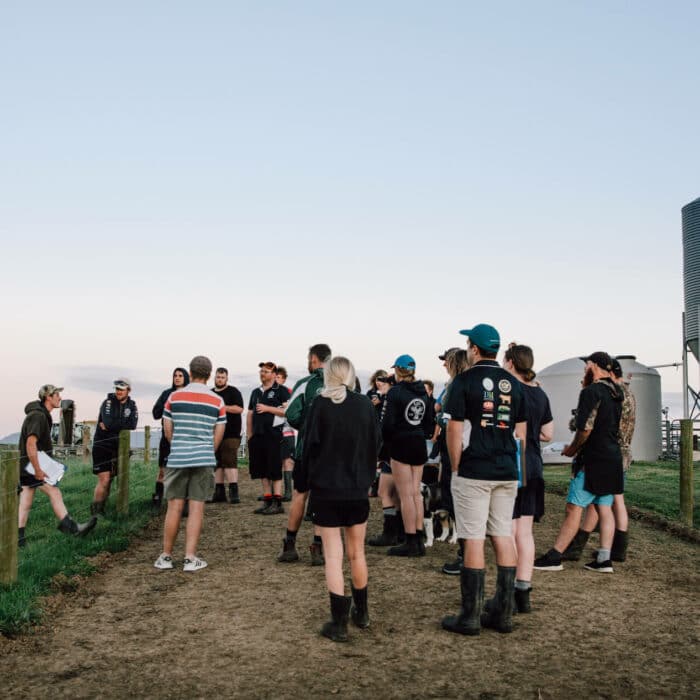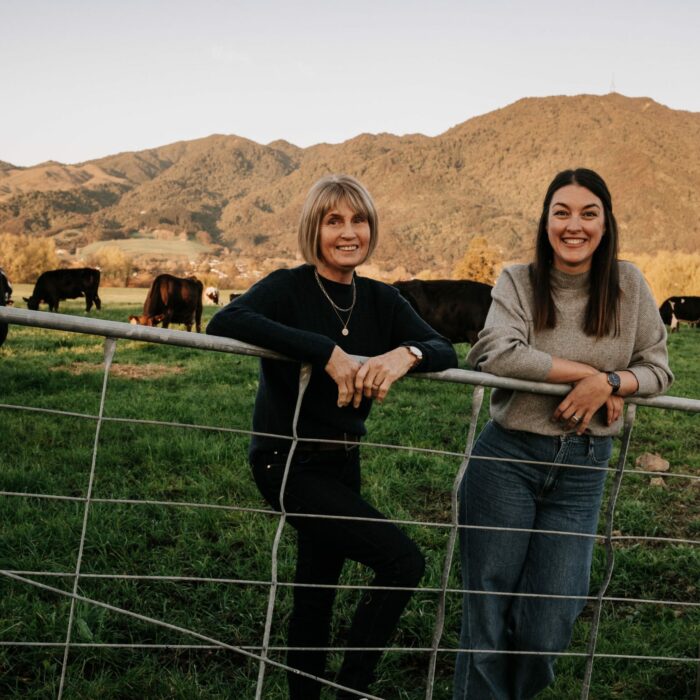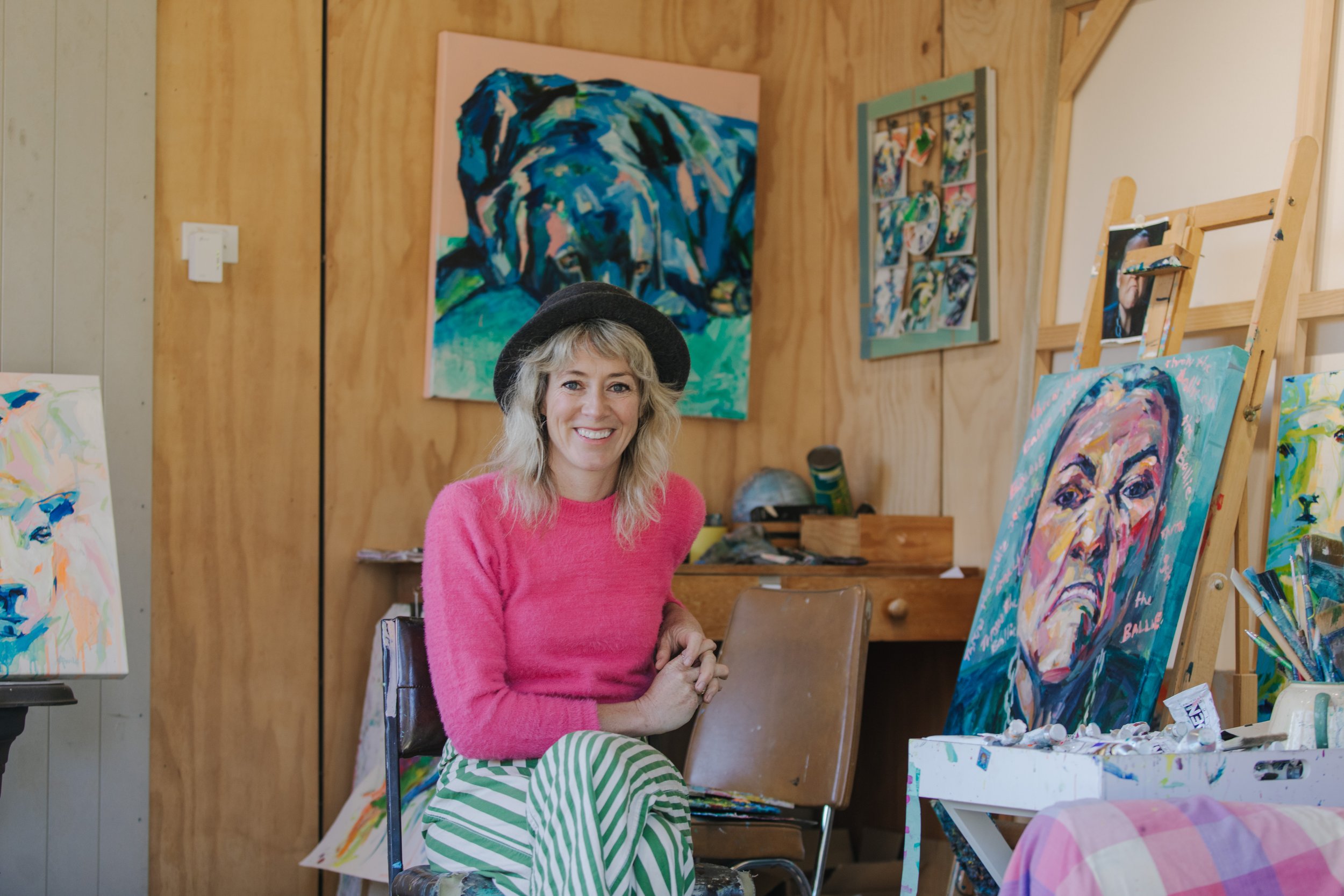
Amelia Dunbar
Creative Arts: The Bitches’ Box + Amelia Guild Art
Windwhistle, Mid Canterbury
What gets you out of bed in the morning? Literally? Children, generally. Or animals. Or animal-like children. Figuratively? Same again and probably the husband. No, I guess my main motivation in doing what I do comes from a deep down, long-held desire to create and do the things that make me happy – painting and performing. If that, in turn, means I can derive an income for my family and also inspire my children to follow their passions in life, then that is motivation enough for me.
What have you learnt from being in business? The satisfaction at the end is always so much greater when the journey to get there is a bit uncomfortable (or straight-up gruelling). Job security isn’t a phrase you ever really hear uttered in the acting/art worlds. In order to make it a sound career path, you need to be prepared to work at the less glamorous bits and wade through the treacle of learning new skills. Establishing and running a rural business often means cutting a new path or asking people to buy into a new concept. I've been lucky to have had support and backing from the rural community in both my art and theatre work and feel encouraged to continue creating work, whether on canvas or on the stage or screen, to positively reflect this community.
What’s your morning ritual? At the moment it’s getting the kids out the door and then getting on the phone to try and source money to fund our feature film! Through the support of some wonderful rural companies, my mornings are becoming less admin and more oh-my-it’s-really-happening.
How did you come up with the idea for The Bitches’ Box? Emma and I were paired up as strangers at an artists’ collective over ten years ago. I was the country kid, she was the city girl (who hadn't even been to the South Island at that stage!). We had to come up with a ten-minute piece of entertainment … it literally could have been anything 'entertaining'. We settled on some shared common interests: comedy, talking animals and the idea of being in a confined space and not a lot happening. Naturally I suggested dogs in a bitch box. After a quick crash course on what that was, Emma was in, and we wrote the first iteration of our flagship show The Bitches' Box.
How do you stoke your creativity? As an artist just being alone in the studio is enough to stoke the creativity (cough *children* cough) and then when I’m in my little haven I dive deep into podcasts and paint the subjects that populate my world the moment I step outside of the house. For The Bitches' Box work, naturally the inspiration for the characters comes from the dogs in my life, but the main flow comes when I get in the rehearsal room with Emma to improvise and write all the weird and wonderful things we can about the inner workings of a dog.
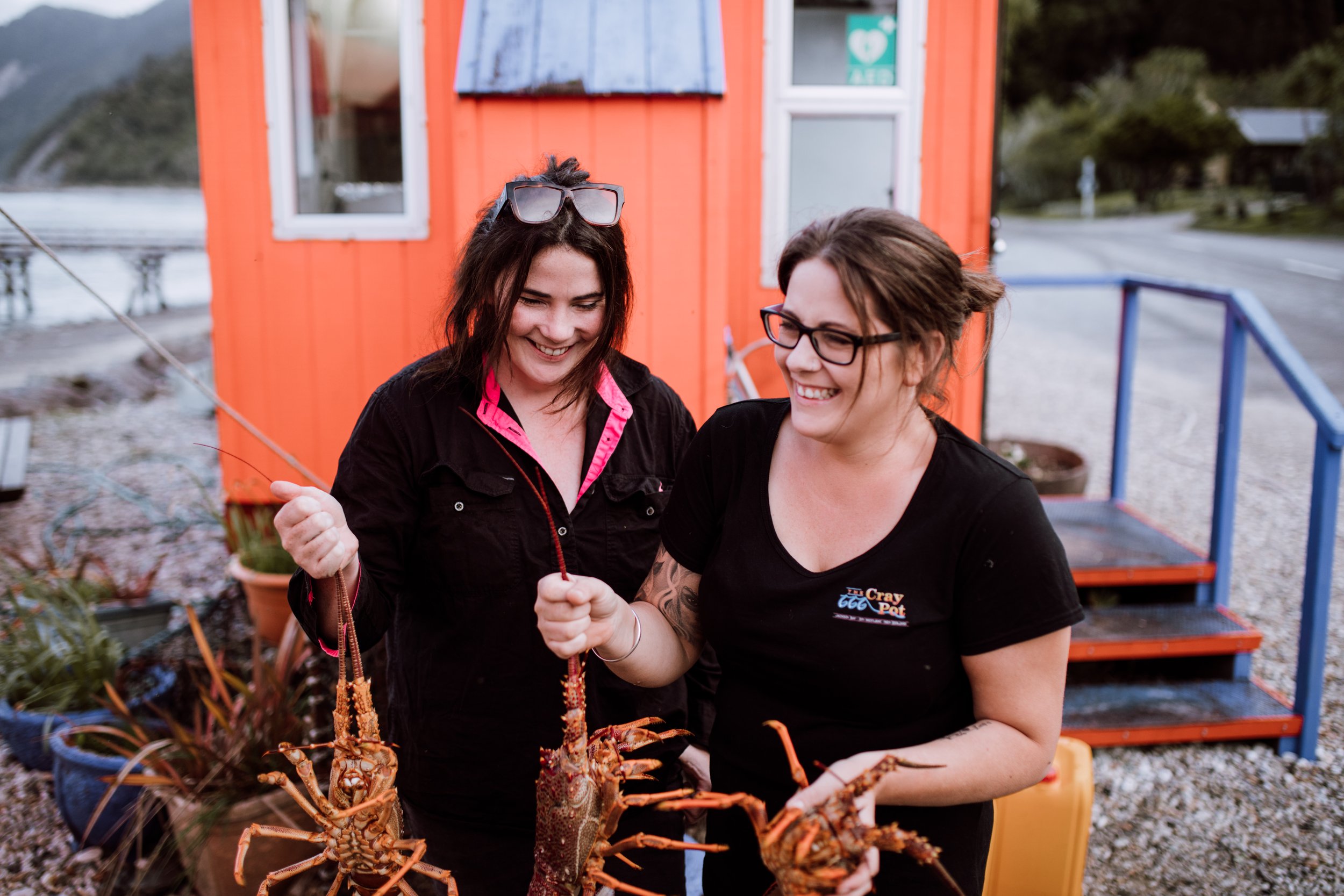
Dayna and Nicole Buchanan
Bountiful Table: The Craypot
Jackson Bay, South Westland
What gets you out of bed in the morning? The sense of responsibility to our team, and the fact we love what we do – we love our team of girls and we love our location. We have a great relationship with all of our staff members and look forward to seeing them each day. And toddlers and animals get us up a lot earlier than we would like!
What have you learnt from being in business? It’s important to work on your mindset. There are a lot of mindset challenges when starting a business, and everyone struggles with different things at different stages of their business. Whether that is owning your value, staying positive, or any other mindset challenges, working on this is what will help you succeed. Also that communication is so, so important – making sure everyone is on the same page. Positive team energy helps maximise productivity and ensures everyone loves coming back. Working in hospo teaches you skills every day. It teaches about swift problem solving, patience – which is very important if you come across someone with severe allergies – and you need to be so careful to make sure there is no cross-contamination. Loyalty and brand over revenue. Addressing short-term goals helps build brand loyalty, resulting in return customers.
What’s your morning ritual? Coffee, feed and dress the toddler, shower, feed the cats and dogs, run the dogs, coffee, check the cattle and calves, more coffee, then meet our team at the storage shed, load up and hop in our van, and start the forty-kilometre commute to work.
How long have you lived at Jackson Bay/surrounds? We are born and bred West Coasters, growing up on a deer farm in South Turnbull. We both attended Haast Primary School, which includes intermediate, then were shipped off to boarding school. After this, Dayna moved to Wānaka for a couple of years before moving home. I [Nicole] went on to Australia to work on Blina Station, then headed home and on to Lincoln University to study for a diploma in agriculture, before taking on various farming jobs around Southland and Otago, returning home in 2019.
What work were you doing before taking over The Craypot? I [Dayna] have mainly always been involved in the hospitality industry, starting as a school-holiday job. After school I did a hairdressing apprenticeship in Wānaka, but I realised it was not what I wanted, so I was back in the hospitality game. I started out cooking a little at a local restaurant, but most of my learning was at The Craypot, as I worked alongside the previous owner for thirteen of her fourteen years there, before eventually taking over ownership with my sister in 2018. During this time, in 2010 I moved to Greymouth to complete my certificate in Culinary Arts, as well as studying through City & Guilds of London. I [Nicole] did a little bit of hospitality work as a youngin’ for school-holiday jobs, however, after school I went on to farming, which I have always been very passionate about. I went to Western Australia for a year to work on Blina Station, which was an amazing experience but I was happy to head home. I then worked on farms in Southland, before heading to Glenorchy when my sister approached me about buying a cafe with her. I thought she was having a laugh but she was dead serious, and it is the best thing we have done.
What have you learnt about business and yourselves over the past four years of running The Craypot? It is important to create experiences that customers remember for the right reasons! Never make a decision based solely on financial gain; you must have a real passion for what you are doing and the decisions you are making to be worth it. That it's okay to take risks, but they must be evaluated, calculated risks that can help to grow the business. Hard work, organisation, preparation and time management are your best friends when working in the hospitality industry. That having systems in place is so important. We can go away for a few days and know that our capable team can run our cafe without a hitch, and customers get the same great consistent service. Being authentic, being yourself is the best thing you can offer people. We have also learnt that we are a lot stronger and capable than we thought we were.
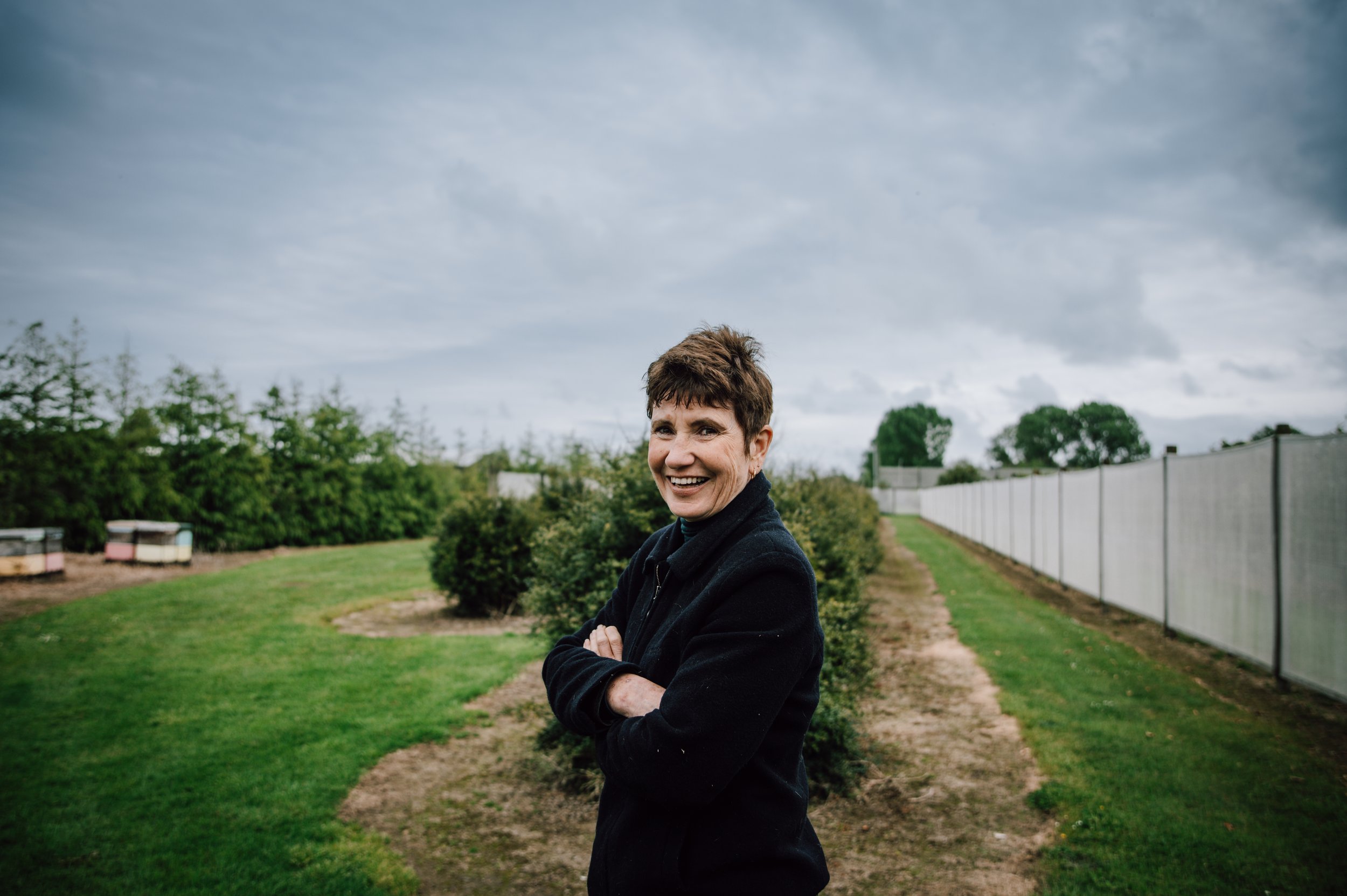
Dianne Downey
Love of the Land: The Limery
Wairoa
What gets you out of bed in the morning? The joy of a new day, the opportunities that it could bring and being in charge of my own destiny.
What have you learnt from being in business? That having a good idea equates to only one per cent. The other ninety-nine per cent is in the hard graft and in the doing, and if you are not prepared to make sacrifices and do the hard graft then don’t even go there. Manage your finances well, by acting on outstanding creditors quickly and always paying your contractors and suppliers on time. When this can’t be done, it is time to put the business under the microscope and find out why, before it becomes a bigger issue.
What’s your morning ritual? Tea and toast for my husband. An awakening shower and breakfast. A quick flick over the global and influencing news, followed by viewing the local area weather forecast and chalking up the staff daily roster board in prep of jobs for the day. Greeting the staff and a Tool Box meeting, with me organising the team before they all hit their respective duties.
What inspired you to start The Limery? I have a passion for start-up businesses and love a blank canvas. My husband, Paul, and I had had previous experience in the beverage industry and were wanting that last hurrah challenge before we hung up our boots. Looking on Trade Me we discovered that land in Wairoa in late 2009 was relatively cheap and we also observed how well citrus grew in the area. We had purchased only 4 hectares, so whatever we grew needed to be high-end. Like a boutique vineyard that produces great wine, we wanted to take a commodity citrus product (in our case limes) and convert it into a brand. Hence the name ‘The Limery,’ enabling recognition of origin and provenance. Our vision was to establish a business that incorporated our passion in the beverage industry, and extend that into the community, and then with their involvement, into an industry.
What were the early days of your business journey like? Starting with bare land was tough. The land had been previously used for growing maize and needed clearing, draining and levelling before we could begin planting. We were funding this by working other jobs (in corporate roles) throughout the week and developing the orchard on the weekends. As the trees grew, we started selling the whole fruit directly to bars and restaurants. I travelled around a lot in my corporate role and would often door-knock the bars and restaurants of an evening selling boxes of limes. The workload increased, and I resigned from my day job to focus on developing the orchard. Two years later, Paul joined me.
What were the challenges when you started out, and what are they now? When we first began harvesting our fruit, it was taken for hand cleaning and boxing in our garage. It now goes directly into our pack house and is cleaned and sorted by machinery along the grading line. A single fruit type with the same season means that it is all go for six months of the year in terms of cash flow, followed by six months of hunger – not an ideal situation for retaining staff and paying ongoing bills. Setting up our juicing and pasteurising operation helped overcome this. It enabled us to supply whole fruit directly to the market during the season while at the same time juicing and freezing down surplus and additional fruit for later use out of season. This has ironed out the troughs and peaks in cash flow to a more regular pattern, enabling sustainability and retention of orchard staff, who also work in our juice-processing factory. A tight budget meant that our juice-processing facility was very much a number-8 wire set-up. Everything in the beginning was very secondhand and sourced from various different industries – kombucha makers, dairy farms, a pharmaceutical company, a seaweed laboratory, a cannery and an historic juice company, with the various pieces ranging in age from two to forty years old. The older equipment was problematic. Parts often no longer existed and were cumbersome to use. Our philosophy is to aim for continual improvement and although this is still a work in progress, we try to upgrade and replace pieces as the business can afford so that we are continually investing back into the business, ensuring its strength for the future. This is especially important to minimise the risk of breakdown, as specialised tradespeople generally need to be brought in from other areas.
In the beginning we were the only ones in our area planting limes. Curious neighbours and various other whānau and iwi groups have over time reached out to us to assist them with setting up their whenua. They, too, are now harvesting and supplying us. Bit by bit and year by year, the combined yield is increasing for those whose trees are already in the ground – and still interest is developing and others are contacting us for assistance with establishing further holdings. This is very important for our combined community growth and development of the Wairoa area, where opportunity has in the past been limited.

Jody Drysdale
Innovation: Hopefield Hemp
Gore, Southland
What gets you out of bed in the morning? Our children are our greatest driver to get up and get going in the morning. We wanted to develop a business that would complement what we were already doing on the farm, and the dream is that the entire operation is something that they can all be part of if they want to.
What have you learnt from being in business? The sales side of the business is very easy for me because I have been a sales rep for the past twenty years, but it has been a real learning curve when it comes to running a website, product forecasting and budgeting.
What’s your morning ritual? I’ve got to have a cup of tea first thing in the morning, and then I get the kids off to the school bus and back to the office to get the orders packed and dispatched.
What led you to start Hopefield Hemp? For a long time, we had wanted to have a homegrown product that we could send direct to the consumer. We didn’t find any satisfaction in just growing commodity crop. We played around with a few ideas before we settled on growing hemp. It was just a matter of finding what fitted best crop-wise and how we could drive business growth without being a financial burden on the main operation. We both love communicating with our customers and have had quite a few from around the country call in on their travels.
How did you learn what to do when venturing into a new product/diversifying? We pretty much flew by the seat of our pants. We knew that hemp would grow in Southland, it was just a matter of getting the licence (that’s a long story) and getting hold of some seed. Once the crop was established, we had to think pretty quickly about how we were going to get the crop harvested and dry. Both Blair and I are pretty stubborn and with any roadblock that presented itself, we managed to find a way to solve any issues. Because there wasn’t anyone around Southland producing a food-grade oil, we really had to work it out for ourselves. We probably did it the hard way, but we have now been involved in helping others get their ventures off the ground.
Where do you want to take it in the future? This 2022/23 season we are increasing our hemp-growing area and are also planning on importing another press to increase our production capabilities (currently we can only process forty kilograms per hour). We are planning on adding to our range of nutraceutical products in early 2023. We also have a couple of other oil seed crops in mind. Export has been in the back of our minds, but at this stage we are happy supplying our fabulous local customers with the freshest hemp seed oil in New Zealand!
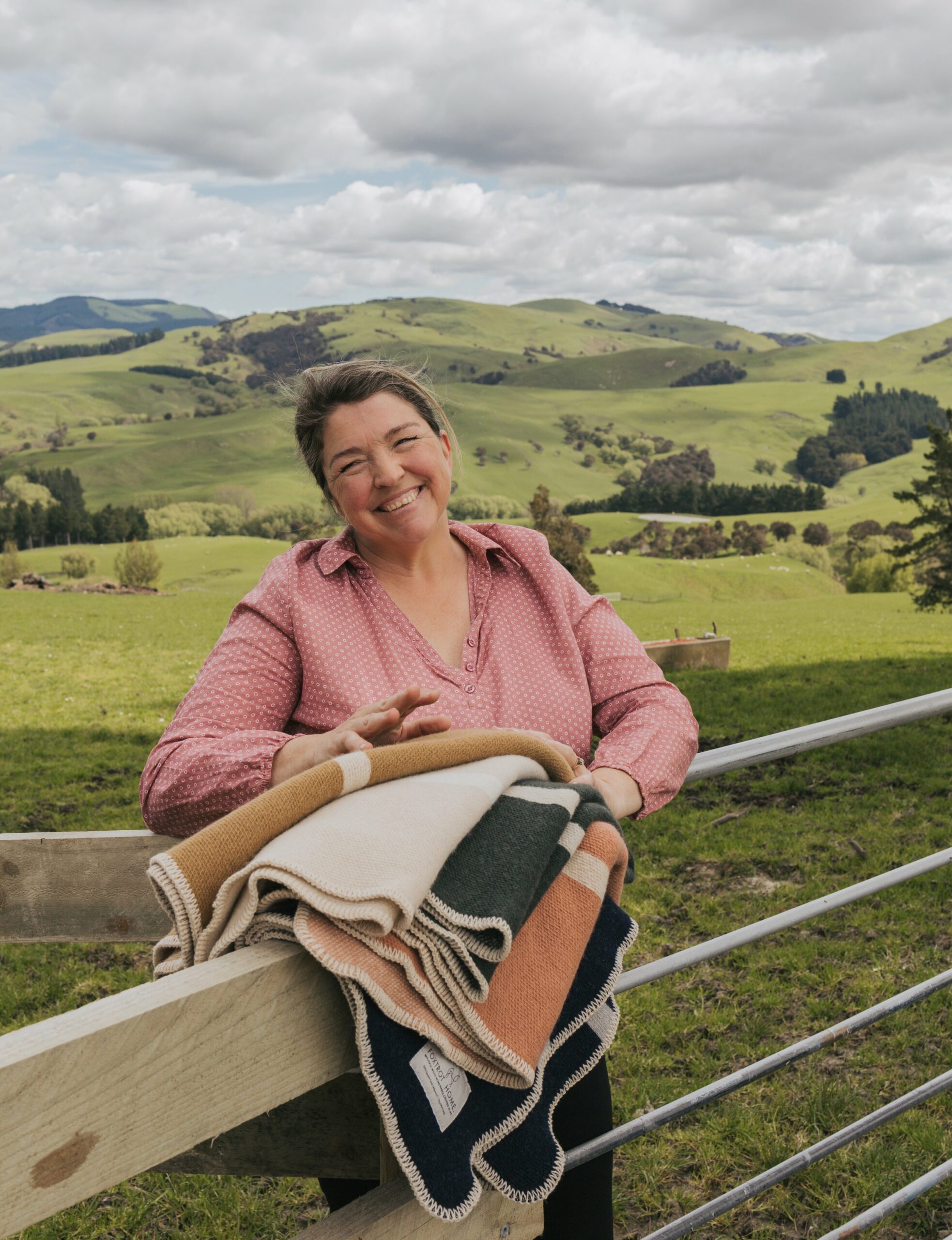
Kate Cullwick
Emerging Business: Foxtrot Home
Waipukurau, Hawke’s Bay
What gets you out of bed in the morning? Above all else? Literally? Coffee! I wake up thinking of my first coffee and seeing my family (with coffee on board so they don’t have to deal with my monstrous side). Not-so-literally: working in a business I love, with women I adore, on our own terms.
What have you learnt from being in business? That it’s 100 times better to work incredibly hard to put money in your own pocket and work your way to your own freedom, than doing it for the wrong employer.
What’s your morning ritual? Whoops – here it is again! Wake up, coffee. Cuddle the kids. Maybe the husband too if he’s not gone already! Then Wordle with cuddles with my elderly sausage dog/Jack Russell cross, Bolt. Plus more coffee …
How have you scaled a business/grown a business from the farm? There are no complicated or secret answers to this. As with most aspects of our business, it has been about building strong relationships with our makers and maintaining excellent communication around the whole process. This includes design, getting the lambs’ wool off-shears, scouring, dyeing, spinning and knitting. And we’ve very fortunately built a good sales platform with our linen, so the wool has just easily piggybacked on this and has slotted into our product offerings seamlessly and beautifully!
What’s it like being in business with your sister? It’s the best! Prue, our brother Ben (who is not involved with Foxtrot usually), and I are all close and understand each other very well. Prue and I have had each other’s backs through some not-so-great times, which has helped form a deep bond with unspoken support and respect. We are super similar but have plenty we don’t see eye-to-eye on … we can easily hang up the phone and blow off steam elsewhere until we’re ready to FaceTime again!
How do you make it work with you in Hawke’s Bay and your sister in Auckland? With Foxtrot Home being strictly online it stands to reason most of the work can be done online too, from anywhere. We set out as an e-commerce store from the start because this was the easiest platform to run and manage from separate geographic locations. There’s not much you can’t cover in a FaceTime call or on Zoom. I do fly up to Auckland to see Prue every two to three months when something needs an intense going-over or when we’re going over designs, for example. We also have to head overseas every one to two years for factory visits, which we manage to pack a lot of other work into on the plane and in hotels, on trains, etc. Lucky us!
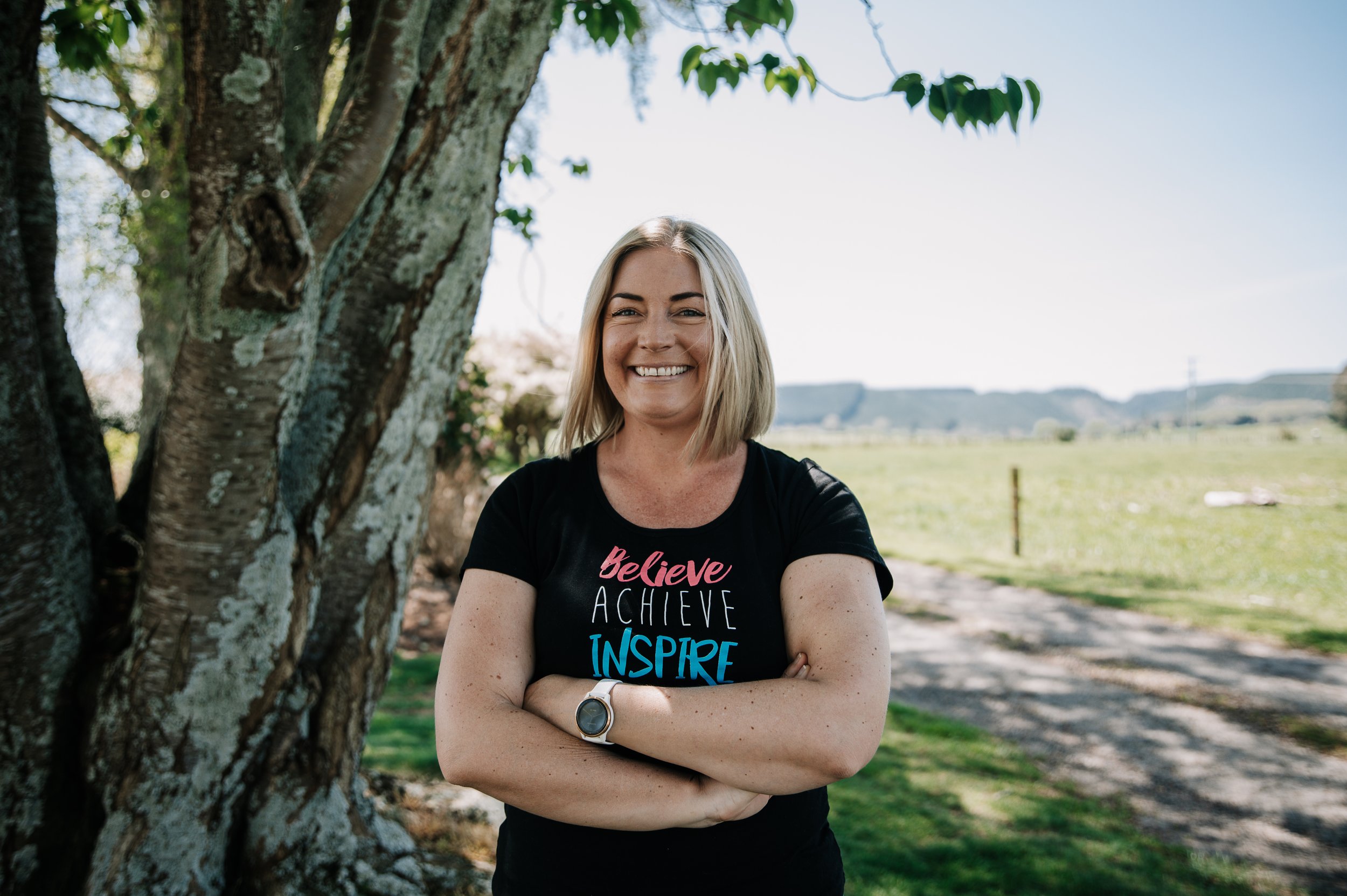
Sarah Martelli
Rural Health and Wellbeing Excellence: Strong Woman
Reporoa, Waikato
What gets you out of bed in the morning? After battling many health issues over the years, each morning that I wake up feeling fit, healthy and strong I am so grateful for! Every day is a chance to live, to laugh, to be with my kids and amazing hubby, and to do the job that I love. I’m so grateful for that. None of us knows what is around the corner and we should never take our health for granted.
What have you learnt from being in business? I’ve learnt that every challenge is just part of the journey, that nobody is perfect and that it’s okay to fail. Small-biz life certainly has its ups and downs, but gosh it’s incredibly rewarding too and even though I sometimes think What the heck am I doing?!, I wouldn’t change a thing. Strong Woman has never felt like a job to me, it’s my baby and I love what I do!
What’s your morning ritual? I love breakfast, it’s my favourite meal of the day, and I truly believe that fuelling your body with a healthy breakfast is super important to set yourself up for the day. I’d also be lying if I didn’t admit that coffee is my vice – I really look forward to my morning coffee! Mum life! Plus exercise, of course, moving your body in the morning sets you up to feel great for the day ahead.
What was the impetus for starting Strong Woman? Having experienced what positive healthy changes did for me after my cancer journey, I wanted to share that passion for fitness and nutrition with others. To inspire other women to become more active, eat well and become stronger versions of themselves. Strong Woman was born, and gosh it’s been quite a ride!
What key ideas around looking after yourself do you live by? What tips do you share with your clients about looking after themselves? As women, we fit 100 things into our days: our jobs, running errands, the farm, committee meetings, being a mum-taxi, cooking and cleaning, kids’ sports and events, taking care of our family’s needs. Basically juggling a million balls in the air at once. But why is looking after ourselves always at the bottom of our own ‘to-do’ list?
Top tip: schedule your exercise in your diary like an appointment, and try your best to stick to it. You wouldn’t miss a doctor’s appointment, so don’t miss your exercise. Remember, you can’t pour from an empty cup! Taking care of your physical and mental health and wellbeing is incredibly important, for yourself and for your loved ones.
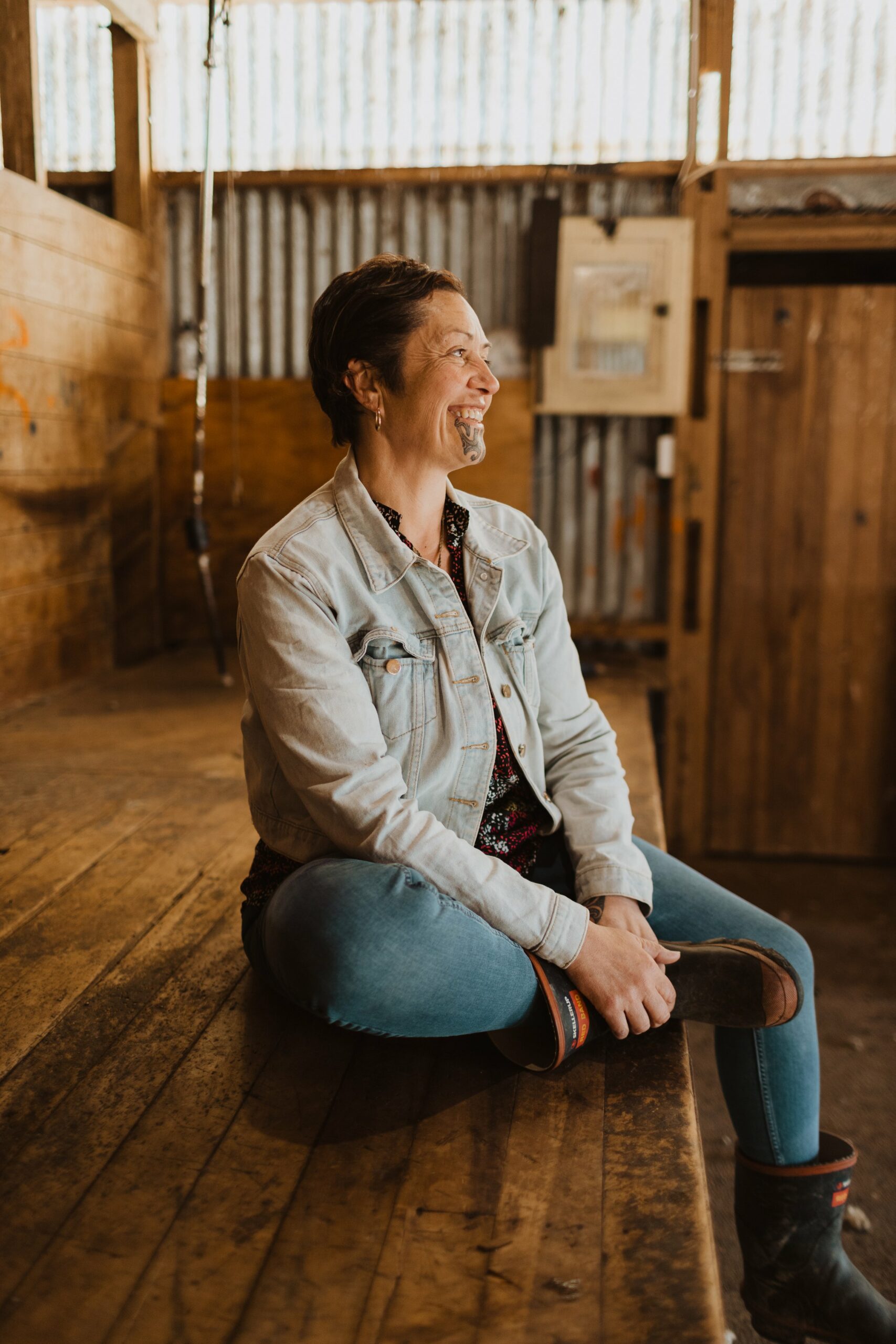
Serena Lyders
Rural Champion: Whānau Consultancy Service
Invercargill, Southland
What gets you out of bed in the morning? Life is exciting and there is so much to learn, see and do. I have six adult children and five beautiful mokopuna that drive me. I want the world to be an amazing place for them to be Māori. For them to experience all that the world has to offer them. To be the best human I can be and utilise my skills to create platforms of change to help others. I am a dream believer and love working with people to realise their potential.
What have you learned from being in business? Oh gosh, so many lessons. I have been in the business of people and their wellbeing for so long and it has taken me a lot of self-reflection, coaching and evaluation to turn that into a financial gain. I have learned about the weight that is put on the amount of financial turnover there is as opposed to the outcomes of the work that you do. I have learned about the differing ways that networking is used in business versus the social sector. If you are not connected to the right people then things are very slow to progress.
It has proved challenging for me as a Māori woman in several ways. Examples of this are that the milestones of success are so different, the value of relationships is based on what benefit you can be to someone else, how much money you have, the size of your voice of influence. Along with the systemic and institutional racism that is rife in our communities. Absolute challenges I am prepared to face and work on! I am very driven by my values and am uncompromising in this regard. I have the attitude that if you are not part of the solution, you are part of the problem.
What is your morning ritual? Getting to work on time is probably my highest priority. I do my social media work, emails and check my schedule before I get up. After I am ready, I normally check my veggie garden and ground myself before heading to town. I live fifty minutes from Invercargill, and I utilise that time to organise my mind and reflect. I let my mind go where it needs to and it ‘tidies up’ my thoughts and ideas. When I arrive at work I cleanse the space, connect to my new surroundings, have a coffee and get myself organised.
What issue did you identify in the shearing industry that you wanted to solve? Not so much an issue that can be ‘solved’, but I wanted to address some of the challenges that are happening in the industry. The industry is said to be more than eighty per cent Māori, and with that comes intergenerational trauma and the impacts of colonisation. This in turn has created a culture or idea of being less than other members of society. Historically, Māori travelled as whānau groups around the farms of their confiscated land, working in the shearing industry. It was possible for women and young men to all work together in a time when that wasn’t normal practice in a rapidly changing society. Generations of this heavy korowai have been carried by the amazing people within the industry. There are social challenges within the industry that are crippling.
I want to acknowledge and mihi to the massive amount of work that has been done previously to raise the profile of the industry by people such as Koro and Mavis Mullins, among many others, professionalising the industry and growing the shearing sports and competitions across Aotearoa and the world.
There is a massive shortfall in access to the services and support that are available to those in the industry to address the social issues that are present. They are a part of our society that is unheard and forgotten, as they leave in the dark and come home in the dark. They are often rural, and with that comes a lack of services, which across the board are centralised. They are often also transient, following work or competitions around the country and across the world. Institutional and systemic racism as well as societal ignorance contributes hugely to the confidence and culture of the industry. The hours of work make it extremely difficult to access services that are available, which of course is weather dependent as well.
The social issues in my opinion are sadly symptoms of our history as a country. The industry is full of exceptional people who are born of divine whakapapa. Many have whānau that have been in the industry for generations. They are some of the hardest-working athletes in this country. They physically push their bodies to the extreme each day for the love of their job. The work ethic is second to none! They pay their taxes but struggle to access the services and support others do! Big things to address, but I believe it is possible. To build confidence and heal the people within the industry physically, mentally, emotionally and spiritually.
What impact can you see your work having on whānau and community? I would like to see it demystify and normalise traditional healing, to identify and build the network of healers across the country for industry to access. This will help address the intergenerational trauma carried by many in the industry. To support the understanding and culture of taking care of their tinana (body) and creating a mindset that acknowledges the importance of that. To lobby for funding and support community organisations and agencies to provide services that fit with those in the industry to support social issues. Not only culturally appropriate but industry appropriate, such as night clinics, mobile services in rural areas, industry-specific navigators and mentors, etc. To be a squeaky wheel at the tables of influence so these people and whānau are made a priority and not forgotten about in the hills of this country. To promote their wellbeing, their whānau wellbeing and the confidence to be able to positively contribute to their community. To celebrate the exceptional skill and ability proudly held dearly by this industry. To greet mana with mana!
What do you personally get from your work? I get lots from this part of my work. My sons are all shearers; my mother still works in the sheds; many of my whānau and friends work in the industry. My mokopuna absolutely love going to the shed and seeing the beautiful people and mahi that happens there. My mahi contributes to it being a better place for my whānau and friends to work. I get the privilege of working directly with those in the industry and being a part of their story. I was raised to be a person of service, and this is just one aspect of doing that. I get to be a part of an industry that I love, although I have chosen to not work there anymore. They are some of the most real, authentic, genuine, and hardworking people I have ever known, and they keep me real and remind me of what raised me and where I come from.
Related Stories
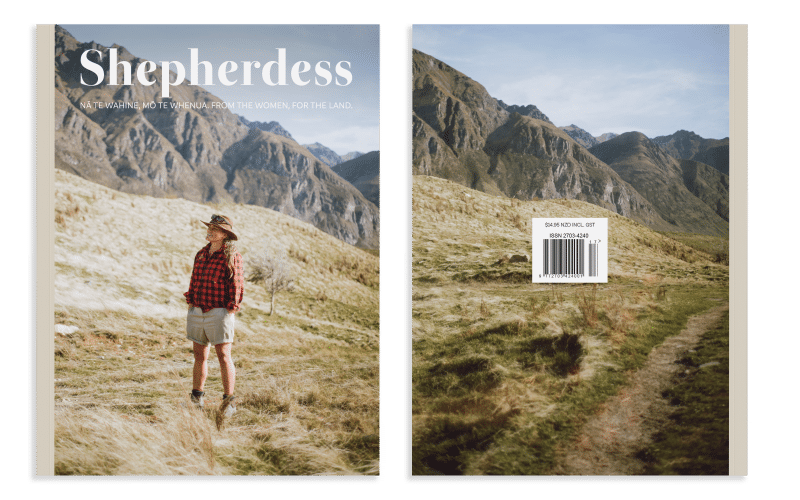
Out Now
Seventeenth Edition
Our beautiful Ngahuru Autumn 2024 Edition is out now!
